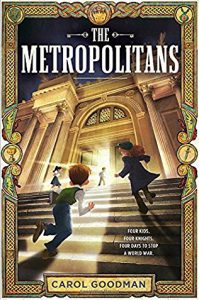For readers who appreciate topics like Arthurian Legend, museum artifacts, bravery, or World War II history, The Metropolitans by Carol Goodman will not disappoint. Goodman blends these subjects in a time-bending myste ry that features four thirteen-year-olds who themselves have endured persecution for their cultural heritage: Madge McGrory, an Irish Catholic; Walt Rosenberg, a Jewish boy; Kiku Akiyama, a Japanese American; and Sose Tehsakónhes, a Mohawk Indian, also known as Joe. The four form the Brotherhood of the Lost, since they have all experienced the trauma of loss but have found one another, bonding in friendship and courage. But with those positive traits come their opponents: betrayal and fear.
ry that features four thirteen-year-olds who themselves have endured persecution for their cultural heritage: Madge McGrory, an Irish Catholic; Walt Rosenberg, a Jewish boy; Kiku Akiyama, a Japanese American; and Sose Tehsakónhes, a Mohawk Indian, also known as Joe. The four form the Brotherhood of the Lost, since they have all experienced the trauma of loss but have found one another, bonding in friendship and courage. But with those positive traits come their opponents: betrayal and fear.
Just as King Arthur, Queen Guinevere, Sir Lancelot, and Morgan le Fay went on an adventure to save their kingdom from evil, Madge, Joe, Kiku, and Walt must join forces and make great sacrifices as they battle temptation and face their fears in order to unlock an ancient code to prevent a terrorist attack in New York in 1941. With each clue decoded through the aide of the Kelmsbury manuscript—an ancient book of Arthurian legends—the teens not only discover the knight or the spy within, but they work to vanquish evil and to stop Mr. January, the man with two faces. While they are battling against the powers of hatred, anger, and revenge to save their country, they are also fighting for family members, a conflict which gives each a personal, vested interest in solving the mystery as well as a motivation for betrayal. As their quest ensues and they battle spies, abductions, and treasonous attacks, Madge, Joe, Kiku, and Walt also learn key lessons:
- Feeling threatened makes a person act differently
- There is no weakness in accepting help from someone else
- In magic and apparent malarkey, some wisdom and some truth also reside
- Gifts/talents should not remain hidden but uncovered and used for good
- “If we never show our true face, we will never see the truth in others” (109)
- Our worst fears have power to control us unless we control them.
But perhaps the most valuable lesson is the one the quartet learns about friendship: “Even the closest friends aren’t meant to do everything together, and the best friendships are those that allow us to grow as individuals” (200).
With rich historical details, interesting plot twists, a multi-layered loyalty theme, and a little magic, The Metropolitans keeps readers engaged from beginning to end. In Walt Disney fashion, Goodman includes several, more sophisticated morals for adult readers, with my two favorites being that “sometimes we don’t see what’s in front of us because we’re trying too hard to make it fit into what we already know. It’s easier to believe in zeppelins and movie hoaxes than [in a swooping amphisbaena]” (328). And the bonds we form as children may be the most important ones. Goodman’s book also opens conversation about persecution and invites questions about how hate and hurt and fear can skew our view of people and the world.
- Posted by Donna

